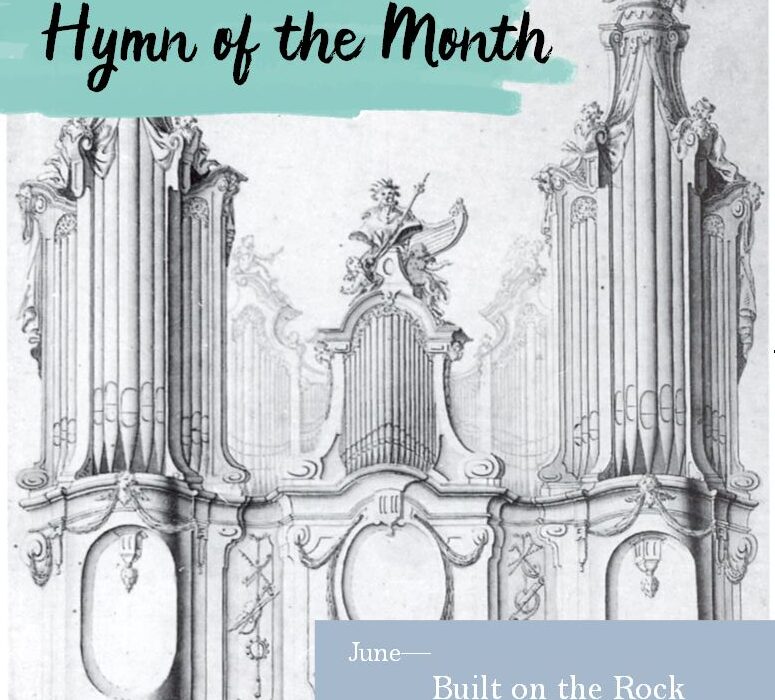Hymn of the Month
Built on the Rock (LSB 645)
The title of this month’s hymn draws upon the recurring theme in Scripture of Christ as the Rock—the Cornerstone, as it were. Both the stumbling block and the ground of faith. From the rock struck by Moses to the rock of Peter’s confession, we are led to the “rock of our salvation” (Psalm 62). But insofar as the Church and her trials are concerned, as this hymn directly speaks to, one cannot help but think of Jesus’ parable in Matthew 7, of the wise man who built his house upon the rock.
The Church is built by the Wise Man—for she is a house founded upon the Rock of Christ. Though tempests may pummel her, and “even when steeples are falling,” her Cornerstone remains secure. Nikolai Grundtvig, the Danish lyricist of this hymn, wrote this hymn amidst the Napoleonic Wars; in 1807, the old cathedral Church of Our Lady in Copenhagen was in ruins due to English bombardment. And so, through every age, has the Church seen her sanctuaries ravaged—whether through the casualties of war, as in the carpet bombing of Dresden, or in direct persecution of such recent phenomena as communist purges or Islamic terrorism. Nonetheless, “we are God’s house of living stones.” It is astounding that for millenia, she has been under attack and yet thrives despite oppression. “On this rock I will build My church, and the gates of hell shall not prevail against it” (Matthew 16:18)!
Stanza one poetically casts all Christians, both those “young and old… but above all the souls distressed,” as those longing for the rest of eternity. We in this present moment, in this present place, have little to complain about; yes, the persecution even in this freest of nations increases, and yet we have lost little. But, whether faced with fearsome lions or internet trolls, the Christian knows this is not his home. This parched desert leads us to long for the Promised Land, replete with God’s own presence—that “rest everlasting.”
Stanza two quotes our beloved apostle, Paul. In a reading we recently had in our pericopes, he addresses the Gentiles in the Areopagus, telling them, “The God who made the world and everything in it is the Lord of heaven and earth, and does not live in temples built by human hands” (Acts 17:24). Rather, as Paul later writes to the Corinthians, “You are God’s temple and… God’s spirit dwells within you” (1 Corinthians 3:16). Grundtvig beautifully relates this wonder, first expressing the incomprehensible majesty of God (“High above earth His temple stands, All earthly temples excelling”), and then constrasting that with His deep longing to “live with us in love, Making our bodies His temple.” Who but God would exalt the lowly, and deign to fill our mortal flesh with His own presence!
“You yourselves like living stones are being built up as a spiritual house” (1 Peter 2:5). So begins stanza 3, declaring that we are “built for His own habitation.” As the cloud of God’s presence descended upon the Holy of Holies in the days of old, resting upon the Ark of the Covenant, He comes now in a more perfect way: He inhabits every sanctuary, resting in Flesh and Blood upon the altar… and more, He inhabits our own bodies, His presence descending upon our lips and tongues. That place where prophets once feared to tred has become the body of the baptized. And indeed, “He by baptismal grace us owns, Heirs of His wondrous salvation”! The hymn stanza goes on to reference Matthew 18, for where “two or three are gathered in my name, there am I among them.”
Stanza four is a glorious tribute to the Sacraments, Christ’s promised presence among us: the font, the altar, the Supper. The Scriptures, a further mystery, are likewise invoked. Herein we find the entire liturgy of the Christian life contained: baptism, preaching, and the Lord’s Supper.
The last stanza leaves us in apocalyptic ecstasy. Echoing the Lord’s Prayer, we begin by pleading that God’s will be done—the cry of hundreds upon hundreds of years of Christianity; and a cry that we know shall be answered! We end by “rubbing God’s own words in His ears,” as Luther would say: “I know My own; My own know Me” (John 10:14); “You, not the world, My face shall see” (John 14:19); “My peace I leave with you” (John 14:27). Amen! These are the words of our deliverance. These are the words of the Church’s final salvation!



